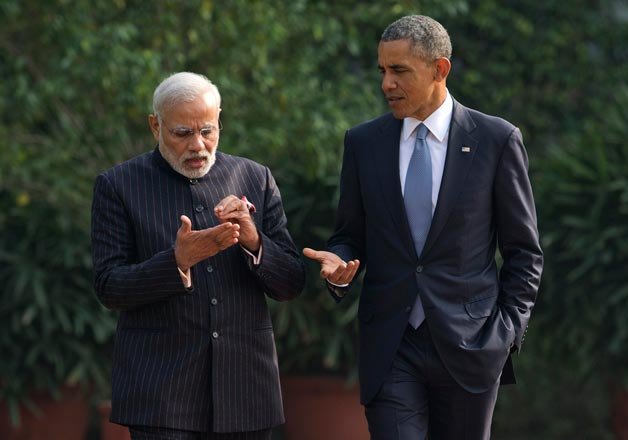Washington: The "breakthrough" achieved by US President Barack Obama and Prime Minister Narendra Modi over the civil nuclear deal, six years after it was signed, dominated American media coverage of Mr Obama's unprecedented second India visit.
'Obama, Modi Say Progress Made on Civil Nuclear Trade,' said a headline in The Wall Street Journal, while another in The Washington Post said 'Obama, India's Modi claim breakthrough on nuclear issues.'
The New York Times said President Obama swept aside past friction with India to report progress on climate change and civilian nuclear power cooperation as he sought to transform a fraught relationship marked by suspicion into an enduring partnership linking the world's oldest and largest democracies.
"Mr Obama's visit, his second as president, is a major event in India. Despite lingering distrust in many parts of the government, largely over Washington's history of support for rival Pakistan, the United States enjoys widespread popularity among the general population," said the daily.
The Post reported that Mr Obama and PM Modi said the two countries have made progress toward resolving nuclear issues at the start of a three-day visit that is heavy on pageantry and symbolism.
"The understanding, though short on specifics, moves toward resolving one of a number of nuclear-related issues that have hamstrung the countries for years and has prevented the implementation of a landmark nuclear deal reached during the George W Bush administration," it reported.
Major US dailies reported that Prime Minister Modi broke the protocol to receive Mr Obama at the airport in New Delhi.
"The trip is one filled with symbolism that they hope will translate to a stronger relationship between the two countries," the Post said.
In a story, The Wall Street Journal said after extended talks, Mr Obama and PM Modi informed they had resolved some of the issues that have prevented US firms from investing in nuclear power plants in India, but left unclear what sticking points remained.
"The visit to India was expected to showcase the deepening relationship between the two countries, as well as a burgeoning personal relationship between the two leaders. Their rapport was on display at a news conference Sunday, during which Mr Obama joked that Mr Modi had been received like a Bollywood star during his visit to the US and said that the two leaders had compared sleep patterns," the financial daily said.
The New York Times said the display of friendship stands in stark contrast to the state of the relationship just a year ago after the arrest and strip search of an Indian diplomat accused of exploiting a housekeeper in New York.
Both the leaders have made it a priority to move beyond that dispute, even though some advocacy groups fretted that meant Washington would turn away from serious human rights issues, the daily said.
Following is a chronology of the India-US nuclear deal:
July, 2005: Prime Minister Manmohan Singh and US President George W Bush agree in principle to a landmark civilian nuclear cooperation deal, seeking to reverse US policy of opposing nuclear cooperation with India.
Oct, 2008: Bush signs legislation to enact the landmark US-India civilian nuclear agreement.
Oct, 2008: External Affairs Minister Pranab Mukherjee and his US counterpart Condoleezza Rice sign the deal.
Aug, 2008: International Atomic Energy Agency approves the safeguards agreement.
Sept., 2008: India is granted the waiver at the Nuclear Suppliers Group meeting in Austria.
Aug, 2010: Parliament passes the Civil Liability for Nuclear Damages Bill, which allows the operator to sue the supplier in case of an accident, inviting protests from US companies.
Jan 25, 2015: Prime Minister Narendra Modi and US President Barack Obama announce a breakthrough to end the logjam over the operationalisation of the deal.

